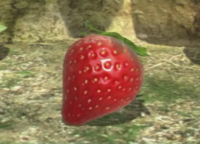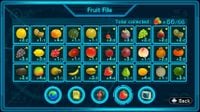Fruit: Difference between revisions
mNo edit summary |
(→List) |
||
| Line 99: | Line 99: | ||
|2 (2 parts per fruit) | |2 (2 parts per fruit) | ||
|[[Tropical Wilds]], [[Distant Tundra]] | |[[Tropical Wilds]], [[Distant Tundra]] | ||
|Green | |Green kiwi | ||
|- | |- | ||
|style="text-align:center"|{{icon|Dusk Pustules|nosize=y}} | |style="text-align:center"|{{icon|Dusk Pustules|nosize=y}} | ||
Revision as of 20:37, January 3, 2019
Fruits are the reason for Alph, Brittany and Charlie's visit to PNF-404 – by retrieving pieces of fruit scattered around the planet, and extracting the seeds, they are able to solve the hunger problem in their home planet, Koppai.
Similarly to ship parts and treasures in the previous two games, the collection of these items is necessary in order to complete the game, and they are normally found in specific locations, commonly accompanied by some sort of challenge which must be completed to access them. Some fruits are split into parts, where all parts must be recovered before the fruit is recognized. On top of working towards the goal of kick-starting cultivation on Koppai, the fruits are directly useful to the explorers, as they need to feed on their juice every day.
In total, there are 66 fruits, belonging to 30 different types, with some of them having served as treasures in Pikmin 2, bearing the same name. There is a grand total of 98 days' worth of juice, including the three bottles the explorers keep at the start as provisions. Day 99 can be played but the Koppaites will have no juice at the end. Interestingly, by highlighting day 1 on the day selection menu, it'll show that at the start of that day, the explorers had 7 bottles of juice. Given that at the end of the day, there are only three bottles on the inventory, this means that when the Drake crash-landed, four of the provisions got lost.
Juice
|
This article or section is in need of more images. Particularly: |
The collection of fruits serves more than just completing the overall goal: fruit collected is juiced at the end of the day to provide rations for the explorers. Juice is stored into bottles, and a bottle is only closed and made available if it's filled to the top. For this, the leaders will even mix juices of different fruits, if need be. After everything has been juiced, the crew grabs the oldest bottle and consumes it, regardless of how many people there are to feed on it. As such, the amount of juice the player has will determine the amount of days left they can explore. If a day ends and there are no more bottles of juice, the game is over, although the player is allowed to retry from a previous day.
Different fruits provide different amounts of juice, with the lowest possible being half a cup, the maximum being 3, and the average being 1.4. When two different juices are placed on the same bottle, the resulting juice's color will end up as a blend between the two. This is purely aesthetic and affects only the color seen on the bottle. To determine the final color, the game averages the hue and value components of both the existing and the new juice. This works fine for most cases, but in the case where the player collects a Juicy Gaggle and a Zest Bomb and their juices are combined, this results in the color #00FFE5, which is a vibrant blue. Although this color blend is correct, it does not look very natural; indeed, in the real world, combining raspberry and lime juice results in a grayish brown mix.
The bottles have some Koppaite text on them. On the glass, there is the text ![]()
![]() ("FJ"), which could mean "fruit juice". On the frame, the word
("FJ"), which could mean "fruit juice". On the frame, the word ![]()
![]()
![]()
![]()
![]()
![]()
![]()
![]() ("survival") can be read.
("survival") can be read.
- GameOver.jpeg
The Game Over screen that is shown when the crew runs out of juice.
List
In addition, the following two special types of fruits can be found in Mission Mode and Bingo Battle:
| Icon | Name |
|---|---|
| Golden Sunseed | |
| Golden Grenade |
Fruit File
- Main article: KopPad.
The Fruit File is one of the options available on the KopPad. It provides information on all collected pieces of fruit, and by tapping on a fruit, the player can read Brittany's Notes on it.
Piktamin U
"Piktamin U" is a fictional vitamin that the Koppaites claim is in some fruits. Its name is a pun on "vitamin" with "Pik" at the start, and the "U" is the vitamin's name, in reference to the Wii U. Oddly, even the Golden Sunseed, which seems to be more of a treasure and less of a food, is said to have a lot of Piktamin U, in a Mission Mode tip.[1]
Treasures as fruits
In Pikmin 2, some treasures are actually fruits. They do not serve the same purpose as the collectibles in Pikmin 3, but are fruits nevertheless:
 Cupid's Grenade: same as the Pikmin 3 fruit.
Cupid's Grenade: same as the Pikmin 3 fruit. Sunseed Berry: same as the Pikmin 3 fruit.
Sunseed Berry: same as the Pikmin 3 fruit. Combustion Berry: a larger strawberry.
Combustion Berry: a larger strawberry. Seed of Greed: a chestnut; botanically a fruit.
Seed of Greed: a chestnut; botanically a fruit. Disguised Delicacy: same as the Pikmin 3 fruit.
Disguised Delicacy: same as the Pikmin 3 fruit. Insect Condo: same as the Pikmin 3 fruit.
Insect Condo: same as the Pikmin 3 fruit. Citrus Lump: same as the Pikmin 3 fruit.
Citrus Lump: same as the Pikmin 3 fruit. Love Nugget: a tomato; tomatoes are considered vegetables for culinary purposes, but are botanically fruits.
Love Nugget: a tomato; tomatoes are considered vegetables for culinary purposes, but are botanically fruits. Infernal Vegetable: a bell pepper; likewise, bell peppers are botanically fruits.
Infernal Vegetable: a bell pepper; likewise, bell peppers are botanically fruits.
Gallery
- Every Tropical Wilds Fruit.jpeg
Every fruit from the Tropical Wilds.
Trivia
- According to Brittany's notes, Alph is allergic to both the Heroine's Tear and the Scaly Custard.
- Including Mission Mode and Bingo Battle, the Cupid's Grenade is the most common normal fruit in Pikmin 3, appearing 20 times. The most common golden fruit is the Golden Grenade, appearing 23 times.
- All the fruits in Pikmin 3 appear to be fresh and undamaged, which is odd, considering some of them are buried, underwater, not growing on any plant (except a few), and even ingested by creatures.
- The Fruit Files for Dawn Pustules and Dusk Pustules state 20 Pikmin are needed to carry them. While there are 20 grapes to carry in each, just one Pikmin can handle the entire task by carrying one at a time.
Names in other languages
| Language | Name | Meaning |
|---|---|---|
| Nourriture | Nourishment | |
| Nahrungsquelle | Source of nourishment | |
| Cibo | Food | |
| Alimento | Nourishment |
See also
References






